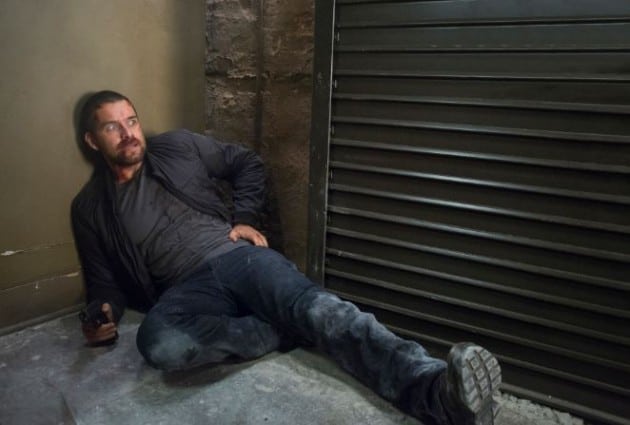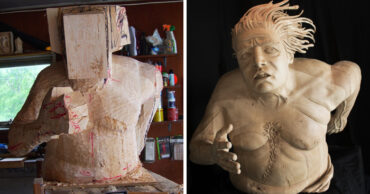
“Everything you touch turns to blood.”
From the moment “Tribal” begins, it establishes itself as a very different episode of Banshee. Dark, saturated flashbacks of Siobhan and Hood are set against a foreground of falling pieces of plaster, a contemplative, romantic expression of human connection, of the one good thing Hood’s found since he came to Banshee. And in a moment, it is shattered by the gunfire of Chayton’s army, kicking off as intense an hour you’ll find on television, a roller coaster ride that once again raises the bar for what Banshee is capable of.
The moment Hood kicks the emergency alarm and barricades in the Banshee police department, “Tribal” becomes a bottle episode/homage to Assault on Precinct 13, and a beautiful one. There’s a certain elegance to the rhythms of the episode; each wave of attack by Chayton on the precinct pushes characters further and further to the brink, external pressures that increasingly draw people inwards, to examine themselves under the flickering lights. Brock thought about how he’d be a better sheriff, and how much blood’s spilled in town (and, really, in the precinct building alone) since Hood showed up. Siobhan battled with what she’d learned about Hood, reeling in the fact he’d been able to live such a convincing lie right under her nose. Raven faced the consequences of killing someone in his own tribe… the list goes on and on; slowly but surely, Adam Turgen’s script intertwines each and every one of these examinations as death creeps closer and closer to their door, represented as OC Madsen’s camera draws closer and closer to each character’s face, to the point you can see the sweat glistening in each person’s pores as the third act carries on.
This symbiotic tone between camera, script, and performance allows for the tension (both physical and emotional) to build and build; and as “Tribal” pushes into its second act, it begins to unravel each of the stress-ridden characters in harmonious fashion. Kurt Bunker’s conversation with the DA is one of the early highlights from this shift towards character in the second act; it makes a neat parallel to Hood’s supposed youth, where we can easily see a street-hardened Hood being taken in and a youthful Rabbit looking to bring a young person up in the world. It’s a beautiful scene, but one that’s quickly topped by Siobhan and Hood’s conversation in his office, of course, the absolute foundation of the season to this point.
It’s impossible to talk about that scene without talking about where it ended up; if there’s any knock to be had against “Tribal,” it’s how openly it telegraphs Siobhan’s death, keeping her millimeters out of harm’s way for most of the episode, even as she becomes more and more vulnerable, physically and emotionally. What makes it work, however, is Trieste Kelly Dunn’s performance, which beautifully captures the inner conflict of Siobhan’s feelings for Hood and his place in her life. Her pragmatism regarding his past clears the path for an emotional conversation, one that seals their relationship as the true core of Banshee‘s noir; Siobhan was Hood’s dream, the anchor to which he’d tied his identity to. He could never really do it with Carrie; he loved her when she was Ana, a woman she no longer was. Siobhan only knew him as Hood, and thus became the fresh start, the chance for evolution that she spoke to on her front porch in the opening flashback – and it’s that important emotional distinction that sells the heartwrenching final moments, when Siobhan’s machete-assisted victory turns terrifying when Chayton emerges from the shadows.
Siobhan’s death, coming on the heels of Nola’s, marks a disturbing trend on Banshee to remove the most powerful women in their world; the DA doesn’t know how to shoot a pistol, and Carrie’s been sidelined for most of the season (and let’s not talk about Deva as a powerful woman on Banshee, because that would just be silly). Siobhan’s horrific death only reduces the women with true agency in the world of Banshee – that being said, how the show frames her death makes it impossible to completely reject. Again, she has become the defining female in the noir of Hood’s life; the death of that character in most fiction catalyzes the true onset of darkness for the protagonist, a dark time that no manhunt will ever be able to solve.
Yet this is Banshee noir, so there is no redemption or nobility to be had in revenge; Chayton lost every man he had to take out Siobhan, and every single small victory in this episode is met with a much larger crap pile to deal with (highlighted when the lights go out and Brock resignedly says “Well, this sucks”). Kai escapes and calls for help, only to arrive home to see his mother has passed, a moment that suffers a bit in the shadow of the show’s rawest emotional moment, but nonetheless puts a powerful coda on an episode about the blood that spills from the hands of men unable to reconcile with their pasts – and an hour that can safely slot its spot among the best we’ll see in 2015, on the big or small screen.
[Photo via Cinemax]
 Follow Us
Follow Us





